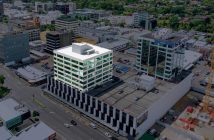On June 17, NAI Harcourts led the way with the first offering of commercial auctions to take place in Hamilton post Covid-19 lockdown. There were many questions and a good deal of crystal ball gazing before we started marketing in mid-May, as to what we would learn about the market. By the turnout of valuers and bankers at the auction, they were also keen to get a better handle on the local market from the coal face. This was a market place very different from the GFC and in fact from anything like anyone in the office had experienced previously – and we have over 100 years of combined experience in the office.
Enquiry varied, with the strongest demand for the tenanted investment properties, but also the forced sale of a vacant industrial site in Te Rapa. Enquiry was softest for a large new vacant industrial unit. While enquiry may have been down slightly from pre-lockdown, the quality of enquiry remained high – all on a cash unconditional basis.
Order of Sale:
127 Tasman Road in Te Rapa was a forced instructed sale of vacant industrial land. Having two street accesses and being only 3,162sqm, we were surprised at the number of active bidders. Aggressive bidding saw it eventually sell under the hammer at a metre rate of $329sqm.
12 Newton Place in Frankton was an affordable investment, leased to established tenant Sayer Drainage. Situated on a 2,603sqm site with a new 4 year lease in place, it was returning $72,000pa net. There was spirited bidding for what were older industrial buildings and eventually sold under the hammer at a yield of 5.46 percent.
128-130 Maniapoto Street in Otorohanga was leased to Wintec who had been there since 2011. With a final lease expiry of December 2021, the property was returning $46,182pa net. There was again spirited bidding from a number of parties, with the building eventually sold under the hammer at a yield of 7.01 percent.
31 Earthmover Crescent in Te Rapa was a freehold industrial unit plus office space, totalling 810sqm, but without any yard area. While there was bidding, it did not meet reserve and remains on the market.
What did this auction tell us? That there are active purchasers (often unconditional) in the market place for a wide range of commercial and industrial property types.
In summary – the market appears to be about what we had expected:
- Investment yields have not softened since the March lockdown, as was evidenced by the yields of Newton Place and Maniapoto Street.
- Vacant land appears to have softened, but only slightly, due to the lack of an income stream and greater difficulty in the financing of development land.
- Vacant units and property, particularly new units above $1,500,000 are proving a greater challenge for owner occupiers. Businesses remain cautious in their purchasing decisions due to continued economic uncertainty.
- Purchasers both local and from out of town are viewing Hamilton and the Waikato as a desirable and safe place to invest.
What do we expect to see going forward over the next 6-12 months?:
- It’s likely that a yield gap will appear between A grade investments and the rest, particularly for properties that have a variety of risk elements, whether it be seismic, asbestos, deferred maintenance or the risk of possible looming vacancy.
- Vacant land and development opportunities will become more difficult to finance for many, with greater tenant/sale pre-commitment or capital required up front.
- Investors with money in the bank will continue to seek better investment returns and cashflow, whether it be in property or other investment
classes. While safe, bank returns after tax and allowing for inflation are likely to continue to become less desirable over time. - There is likely to remain a shortage of investment stock, except where vendors have a genuine reason to sell.
- We may see an increase in non-income producing assets or properties with issues come to the market.
At this stage we do not know what true unemployment may look like post the wage subsidy and post the looming election. What we do know is that small and medium enterprises (SMEs) will play a critical role in our recovery and keeping people employed. There appears to be a strong desire by local businesses to retain good staff, as they know a recovery will take place in due course. Businesses in Hamilton and its Waikato towns often have very loyal customer bases and are therefore more robust in times of uncertainty.
For those considering selling, a competitive environment is critical to maximising sales prices, as we are seeing that potential purchasers gain confidence by seeing other potential purchasers being active.
Let’s Support Local and Buy Local!





